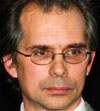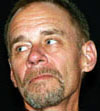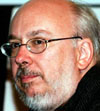| Politics and Popular Culture |
||||
|
Thursday, Feb. 26, 2009
Johanna Blakley is deputy director of the Norman Lear Center, where she performs research on celebrity culture, global entertainment, and digital technology. Stephen Duncombe teaches the history and politics of media and culture at NYU and is the author, most recently, Dream: Re-Imagining Progressive Politics in an Age of Fantasy. He blogs at Reality Sandwich. Moderator: Henry Jenkins is co-director of Comparative Media Studies and the Peter de Florez Professor of Humanities at MIT. His most recent book is Convergence Culture: Where Old and New Media Collide. Co-sponsors: Center for Future Civic Media and Technology and Culture Forum. Summary
Johanna Blakley summarized the activities of the Norman Lear Center and emphasized the need for solid research detailing the ways that entertainment affects politics. David Carr discussed how the Obama campaign took advantage of the intersection between politics and popular culture. Being an Obama supporter went beyond political identity, and often involved the consumption or creation of content that was both political and entertaining. The Obama Girl and WIll I Am videos on YouTube were examples of this.
Stephen Duncombe said that politically minded people have raditionally exhibited one of two attitudes toward popular culture. The first is pessimistic, viewing pop culture as a distraction that both lowers the level of morality in the populace and hinders the ability to make informed and rational decisions about politics. The second is a more populist view, where pop culture is recognized as the voice of the people and celebrated as a kind of popular politics in itself. Duncombe suggested that there is now a third model called mobilization, in which the concern has shifted away from the question of whether popular culture is political or anti-political and focused instead on identifying ways in which it can be mobilized in the service of politics. Because it incorporates elements of the public's desires and fantasies, pop culture can be utilized as a unique laboratory of ideas to be explored, understood, and actualized through political practice. Duncombe said that Obama's brand was successful because he didn't come across as empty and cloying, but still communicated a generalized symbol of hope that people could attach their own meaning to. He correctly read that there were many different cultures and ideals in his audience and identified with a variety of them-- blacks, intellectuals, basketball, hip-hop, etc. Blakley described a recent survey that explored the relationships between political opinions and entertainment habits. When the results were analyzed, three distinct groups of people emerged. The largest group was labeled "red" because it expressed mostly conservative political opinions, the second largest was "blue" because it was mostly liberal, and the smallest was "purple" because it shared characteristics of both of the first two groups. Interestingly, these distinct political clusters also had distinct entertainment preferences, with little overlap among the three groups. The survey also included questions about the convergence between entertainment and politics. Many participants from all three groups reported that they enjoy entertainment that reflects values other than their own or that they think is in bad taste, revealing a significant audience that seemed to be hungry for unfamiliar representations. This was surprising, said Blakley, because it meant that people aren't necessarily attracted solely to entertainment products that reflect their own lives and ideals. Finally, the survey found that a very large majority of people believed political messages were present in fictional television shows and movies, and that many of them actually learned things from these shows. Duncombe remarked that the findings Blakley shared speak to the fact that cultural and political identities are merging. People aren't just finding politics in their fictional entertainment, the definition of politics is becoming increasingly expansive. It now includes many elements that used to be regarded as purely cultural.
According to Carr, one cause of this phenomenon is consumption; if we are constantly consuming, it becomes a metric of who we are. Going to a better grocery store and spending more money on food is a kind of political expression, as is watching a Tom Selleck movie. In the same way, Obama became a cultural marker so that being interested in the campaign became a way to communicate one's personality. Blakley said that conflating pop culture and politics risks undermining substance with glitz. But if more people become interested in the substance because of the entertainment aspect, that's beneficial. Carr reminded the panel that utilizing pop culture is not just a tool of the hip young candidate. Bush won the 2000 and 2004 elections on style points. He didn't appeal to people because of his brain power, they liked him because they identified with him. Duncombe agreed, citing FDR's fireside chats as an even older example of a political figure using new media and poetic, interesting speech to communicate a political message. Style and substance aren't mutually exclusive, as FDR and now Obama have shown. Asked to discuss the role of comedy in the election, Carr remarked that this race raised the quality of political humor because it was such an interesting story. Duncombe pointed out that political humor today has shifted a great deal toward satire and irony, which are types of humor that don't tell you how to think. Instead, they create meaning by forcing the audience to fill in the punch-line. Blakley said that many people assume young people watch Jon Stewart instead of reading the news, but the survey showed that those who got their news from sources like The Daily Show and The Colbert Report were actually the most informed. This made sense because the jokes in those shows aren't funny if you don't know what they're talking about. It's not necessarily the best way of teaching people about politics, Blakley emphasized, but it is certainly an effective means of engagement.
Moderator Henry Jenkins turned the discussion to satire and participatory culture, remarking that people often assume that greater participation means more civility in political discourse, when in fact the opposite is often true. Things that are acceptable in PhotoShopped images online may not be acceptable in the pages of a newspaper. This point was illustrated by the recent controversy over a cartoon in the New York Post considered by some to be portraying President Obama as a chimpanzee. Duncombe agreed, but pointed out that even though internet discourse is often less civil than mainstream media, it's valuable because it's better suited to discussion. Audience Discussion Question: Can you discuss the role of small networks in politics? Duncombe: I admired the Obama campaign's ability to use networking to reactivate civil society. People could join in at various levels and be an activist for a day. They built up a culture of organizing, and the question now is what will happen to it? Will Obama use it in office? Are there ways for community organizers to tap into it? Blakley: Small networks are powerful because they allow ordinary people to become celebrities within these small spheres. That's another example of how elements of entertainment can be injected into the political process in a very functional fashion. Carr: Small networks induce positive feedback on an individual level. People who were involved in the Obama campaign were given a real psychic return for their effort. Jenkins: People learn skills from cultural networks that they can apply to more serious purposes when they find a cause that drives them. For that reason, pop culture consumption today is never individual, it's always social. For example, fan and gamer networks bargain on behalf of consumers, and as they do so they are teaching each other how to act politically. I'm very interested in proto-political behaviors like fans mobilizing to write letters to keep a television show on the air. How do they move from those tactics into forms of political activism? Duncombe: We used to think of consuming as a passive activity, but now people are starting to recognize that it's not necessarily so because we bestow meaning on what we consume. Obama tapped into a fundamental understanding that when people consume a message they want to produce it as well, to put their own little spin on it. Question: What kinds of technology or media trends are in the pipeline now that might substantially affect the 2012 election? Jenkins: We can think logically about where the culture will move us, but no one can say what the specific platforms or technologies will be four years in the future. You can look backwards and locate the beginnings of current trends, but predicting the future is very difficult. Carr: Things can change incredibly rapidly; it's possible a candidate in 2012 could be so radical as to avoid engaging the populace at all. We just don't know. Question: What consequences will the groupings that Johanna's survey identified have? Why are they important? Blakley: We were just trying to identify where the ideological divides fall in this country. We had no idea where they would be or whether there would be coherent groups, but it turned out there were and it was very informative to examine each of them. One valuable thing about these classifications was that they highlighted the substantial presence of this middle group, the purples. We tend to talk about politics in the U.S. as being two-sided -- conservatives vs. liberals, Republicans vs. Democrats. But it turns out that a quarter of Americans are in between, and we know very little about them. Question: Many people find President Obama inspiring. Is this theme of inspiration something that's particularly prominent in our culture right now, or does it just become more apparent when a particular type of person comes along and takes advantage of it? Blakley: I think it's very important to have icons, it's part of what celebrity culture celebrates. I don't think it's new, but it certainly depends on people with huge amounts of talent like Obama, and those don't come around all the time. Carr: Let the economy stall for a few months, let him continue to be unable to get a commerce secretary, let his decisions about Iraq backfire, and his exalted status will dissipate very quickly. I think the great hunger for Obama had more to do with his ability to communicate than with his potential to make strategic decisions. With time, the adulation will wear off. Duncombe: I disagree. I believe that he'll have high approval ratings no matter what goes on in the world because he's at the top of his game. He can turn a disaster into victory. Question: Is there always an opposition between style and politics? Can't they be one and the same? Duncombe: Yes, I think they definitely can be the same. A certain way of speaking and appearing communicates a way of viewing the world. I think style has to be thought of politically all the time. Carr: Our culture has come to admire the ability to wear fame as a loose garment. Obama was able to take the weight of being the first black man in this position and handle it with grace. Blakley: There is so much substance in style. A lot of us would like to think that style is just the surface, but that's never been the case. It always communicates volumes, and the people who understand that are the most able to connect with an audience. Obama is amazingly skilled at that, which is why there has been so much talk about "brand Obama." Branding is about creating a space within a consumer market that's owned by one thing. It would be completely specious to claim we can somehow revive politics by taking the entertainment out of it. Question: What's the role of drama in shaping people's sense of what's possible or normal? Could the images in film and television make people more accepting of something like a black president in real life? Carr: I think it actually works the other way. The reason certain images are successful in entertainment is because they represent the desires of the American population. If I were a politician right now, I'd be watching House every night to try to figure out what preferences are being represented. |
||||




